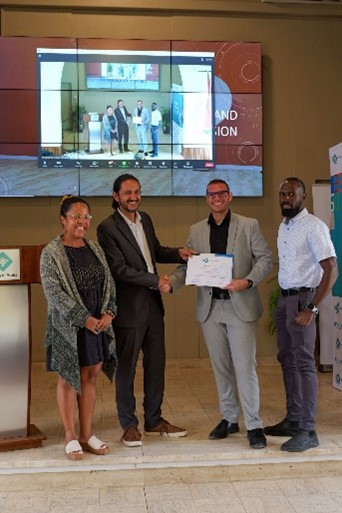
Comparative analysis of CO2 emissions from diesel and electric buses: A case study of ARUBA AIRPORT AUTHORITY N.V.
During a well-attended presentation, Mr. Armand Kelly, who graduated from the University of Aruba in 2023 with a Bachelor of Science in Sustainable Engineering and Technology, uncovered the results of his research on a comparative analysis of CO2 emissions from diesel versus electric buses. It was a case study for the Aruba Airport Authority N.V. (AAA) as part of its vision to become the most sustainable airport in the region—the strategy of AAA is to have investments with the lowest environmental impact as reasonable.
The methodology applied was based on a Life Cycle Assessment (LCA) approach but looked only into the climate change aspects, i.e., the CO2 emissions, to compare these between a diesel-driven and an electric-driven bus. This LCA was based on the processes of sourcing, manufacturing, assembling, distribution, use, and finally, the end of life of a bus. This end of life of a bus comprises ways to recycle, reuse, and, in the end, dispose of the bus. Since limited data was available for the CO2 emissions produced by the Aruba power generation plant, an estimate of 0.709 kg CO2 per kWh was made and used for the comparative analysis.
Therefore, Armand Kelly concluded in this thesis that the electric bus, during a lifetime of 15 years, would emit about 20 tons more CO2 than a diesel bus. However, according to Mr. Kelly, from a simplistic point of view, if Aruba could install 5 Wind turbines of 15 Mw each, lowering the power plant's emissions to 0.659 kg CO2 per kWh, this would lead to the electric bus being a less impactful option.
You can find the slides presented during the talk under 'Documenten'.



KIVI KRING CARIBBEAN – ARUBA wishes you all a Merry Xmas and a Happy New Year!

KIVI KRING CARRIBBEAN – ARUBA also invites you to attend its New Year’s activity with the following title:
Comparative analysis of CO2 emissions from diesel and electric buses: A case study of ARUBA AIRPORT AUTHORITY N.V.
In the Energy Efficiency & Energy Diversification Plan (Nos Pan Nos Futuro Program 5) NSP 2020 – 2022, the Government of Aruba announced one of its strategic objectives to be the reduction of transportation emissions. On page 32 of this NSP 2020 – 2022 the desired point 5 describes action b. to be the introduction of electric or gas-driven busses in public transportation. However, the question is if electric busses are to be deployed: what is the carbon footprint compared to the current diesel-driven busses.
And this is exactly the research work carried out at the University of Aruba by Armand Kelly who won the 2023 award for his thesis. His thesis delved into the fascinating world of transportation emissions to be able for the comparison of the carbon footprints of Diesel and Electric buses.

What Armand uncovered was eye-opening – while electric buses hold immense potential, the infrastructure to fully support them sustainably when charging from WEB's grid needs significant development. However, his research isn't just about numbers; it's about changing perspectives. It is often forgotten that every product carries an environmental cost before making it. It's time to look beyond price tags and consider the ecological price to be paid. Remember, "Green comes in different shades."
Armand Kelly is on a mission to encourage more research and development based on Life Cycle Assessments (LCA) specific to Aruba, involving both private and public sectors. Let's gain a deeper understanding of the unique challenges faced by a small island like Aruba. Critical thinkers are needed who can ask crucial questions like: when does the environmental cost outweigh the eco-social gains?
At the end Armand asks you to join him in the discussion how to assure a greener future. After all sustainable development is according to the 1987 Brundtland report on “Our Common Future” originally defined to be “a development that meets the needs of the present without compromising the ability of future generations to meet their own needs”.
Who is Armand Kelly?

Armand Kelly, a father and a recently graduate from the University of Aruba’s SISSTEM with a specialization in Sustainable Engineering & Technology. Earlier in 2018 during Armand’s bachelor’s degree in Electric Engineering, his group was the 1st place winner in Line Robotics at the University of Applied Science of Rotterdam. At present Armand is a Health, Safety and Sustainability Officer at the Aruba Airport Authority N.V.

KIVI KRING Caribbean - Aruba invites all engineers and others interested to attend this presentation to get more insight in the most recent research to compare emissions between Diesel and Electric Buses. This research used a sample from life cycle assessment (LCA) – methodology to understand the environmental impacts throughout the life cycle of the buses currently bin used at Aruba Airport. This research provides a different perspective on Aruba Airport’s Challenges on its pathway to a greener future.
This activity will take place at the University of Aruba in room 4 at Juancho Irausquin Plein 4, Oranjestad on Thursday January 11, 2024 at 7 to 8 p.m. followed by KIVI’s new year’s networking session from 8 – 9 p.m. while enjoying a drink and a snack. An entrance fee of 10 AWG florins is charged to KIVI members to cover the costs while non-members are charged 20 AWG fls. There is a free entrance for students at the University of Aruba while the entrance fee for the PhD candidates is 5 AWG fls. You can register via the KIVI website.
